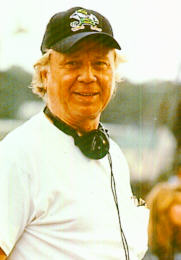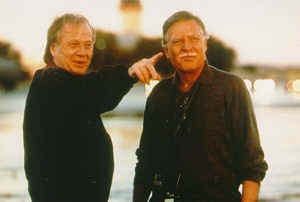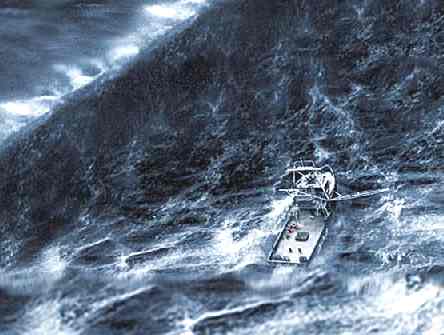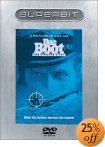WOLFGANG PETERSEN - from Hamburg to Hollywood
SITE INDEX CATAMARAN HULL SOLAR PANELS ELECTRIC MOTORS BATTERIES CREW EXPEDITION MUSIC GOODIES
Wolfgang Petersen first made his mark in the film world with Das Boot (pronounced BOAT, not BOOT! - U.S. radio and TV announcers take note!). Although he had been making feature films in Germany since 1973, and television productions before that, it was Petersen's success with this 1981 anti-war U-boat epic, along with an Oscar nomination for best director, that bought him his ticket to Hollywood.
Wolfgang was born in 1941 in Emden. From 1953-1960, he attended the Johanneum school in Hamburg. In the 1960s, he directed plays at Hamburg's Ernst Deutsch Theater. After studying theater in Berlin and Hamburg, Petersen attended the German Film & Television Academy (dffb) in Berlin from 1966-1970. His first film productions were for German television series.
Wolfgang Petersen
In 1984 Petersen directed The Neverending Story, a partly American-financed project filmed in Munich's Bavaria Studios. Although some critics dubbed it “the neverending movie,” it would be his most successful “Hollywood” film for several years.
Petersen's first actual full-blown Hollywood effort (also filmed at the Bavaria Studios complex in Germany), Enemy Mine (1985), was neither a critical nor a box office success. He finally hit his stride in 1993 with the assassination thriller In the Line of Fire. Starring Clint Eastwood as an angst-ridden presidential Secret Service guard, In the Line of Fire gave Petersen the box office clout he needed to direct another suspense thriller, Outbreak (1995), starring Dustin Hoffmann. The 1997 Petersen blockbuster, Air Force One, did very well at the box office, while getting a mix of opinions from movie critics. In another recent project, Petersen executive-produced (but did not direct) Red Corner starring Richard Gere. Now with The Perfect Storm (2000), the former small-town German kid has been on quite a roll!
Wolfgang Petersen was born during World War II on 14 March 1941 in the small north German community of Emden, where the Ems River flows into the North Sea. From 1953 to 1960 Petersen attended the Johanneum school in Hamburg. In the 1960s he was directing plays at Hamburg's Ernst Deutsch Theater. After studying theater in Berlin and Hamburg, Petersen attended the Film and Television Academy in Berlin (1966-1970). His first film productions were for German television, and it was during his work on the popular German Tatort (“Crime Scene”) TV series that he first met and worked with the actor Jürgen Prochnow — who would later appear as the U-boat captain in Das Boot.
By 1998 at the age of 57, Petersen was an established Hollywood director, with the power to both re-release his classic Das Boot in a new director's cut and to helm star-studded action-thrillers such as In the Line of Fire and Air Force One for Sony Pictures' Columbia/TriStar. For both Air Force One and Outbreak (but not for Storm) Petersen teamed up with the German cinematographer Michael Ballhaus, who has also worked frequently with director Martin Scorsese. For Troy, Petersen teamed up with the British cinematographer Roger Pratt, whose previous work includes Batman, Chocolat and Harry Potter and the Chamber of Secrets.
Wolfgang Petersen & Michael Balhaus - Air Force One
“As
a rule, [as a teen-ager in Germany] I went to
the movies
twice a week and also to the Sunday matinee.”
Date of birth (location) 14 March 1941 Emden, Lower Saxony, Germany
-
-
Ender's Game (2006) (announced)
-
The Poseidon Adventure (2006) (pre-production)
-
Troy (2004)
-
The Perfect Storm (2000)
... aka Sturm, Der (Germany)
The Perfect Storm - giant wave
-
Air Force One (1997)
... aka AFO -
Outbreak (1995)
-
In the Line of Fire (1993)
-
Shattered (1991)
-
Enemy Mine (1985)
-
Unendliche Geschichte, Die (1984)
... aka The NeverEnding Story (UK) (USA) -
"Boot, Das" (1981) (mini) TV Series
... aka The Boat -
Boot, Das (1981)
... aka The Boat (USA: dubbed version)
-
Schwarz und weiß wie Tage und Nächte (1978) (TV)
... aka Black and White Like Day and Night -
Planübung (1977) (TV)
-
Konsequenz, Die (1977)
... aka The Consequence -
Tatort - Reifezeugnis (1977) (TV)
... aka For Your Love Only (USA) -
Hans im Glück (1976) (TV)
-
Vier gegen die Bank (1976) (TV)
-
"Stadt im Tal, Die" (1975) (mini) TV Series
-
Stellenweise Glatteis (1975) (TV)
-
Tatort - Kurzschluß (1975) (TV)
-
Aufs Kreuz gelegt (1974) (TV)
-
Tatort - Nachtfrost (1974) (TV)
-
Einer von uns beiden (1973)
... aka One or the Other (International: English title)
... aka One or the Other of Us -
Van der Valk und die Reichen (1973) (TV)
... aka Pas de frontières pour l'inspecteur: Discrétion absolue (France) -
Tatort - Jagdrevier (1973) (TV)
-
Smog (1973) (TV)
-
Tatort - Strandgut (1972) (TV)
-
Anna und Toto (1972) (TV)
-
Ich werde dich töten, Wolf (1971)
... aka I Will Kill You, Wolf (USA) -
Tatort - Blechschaden (1971) (TV)
-
Ich nicht (1969)
-
Rote Fahne, Die (1968)
-
Eine - der Andere, Der (1967)
-
A Spell for Chameleon (2006) (announced) (producer)
-
The Poseidon Adventure (2006) (pre-production) (producer)
-
Troy (2004) (producer)
-
"The Agency" (2001) TV Series (executive producer)
-
The Agency (2001) (TV) (executive producer)
-
The Perfect Storm (2000) (producer)
... aka Sturm, Der (Germany)
-
Bicentennial Man (1999) (producer)
... aka 200 Jahre Mann, Der (Germany) -
Instinct (1999) (executive producer)
-
Red Corner (1997) (executive producer)
-
Air Force One (1997) (producer)
... aka AFO -
Outbreak (1995) (producer)
-
In the Line of Fire (1993) (executive producer)
-
Shattered (1991) (producer)
-
Shattered (1991) (screenplay)
-
Unendliche Geschichte, Die (1984)
... aka The NeverEnding Story (UK) (USA) -
"Boot, Das" (1981) (mini) TV Series
... aka The Boat -
Boot, Das (1981)
... aka The Boat (USA: dubbed version)
-
Planübung (1977) (TV)
-
Konsequenz, Die (1977)
... aka The Consequence -
Tatort - Reifezeugnis (1977) (TV) (screenplay)
... aka For Your Love Only (USA) -
Vier gegen die Bank (1976) (TV)
-
In the Line of Fire: The Ultimate Sacrifice (2000) (V) (special thanks)
-
Kuckucksjahre (1967) (TV) (assistant director)
... aka The Cuckoo Years
-
Troy: From Ruins to Reality (2005) (V) .... Himself
-
Troy: An Effects Odyssey (2004) (V) .... Himself
-
Troy: In the Thick of Battle (2004) (V) .... Himself
-
Starbuck Holger Meins (2002) .... Himself
-
Michael Ballhaus - Begegnung mit dem Auge Hollywoods (2001) .... Himself
-
Bernd Eichinger - wenn das Leben zum Kino wird (2000) (TV)
-
One Vision (1998) .... Himself
-
Wolfang Petersen: Mein Weg nach Hollywood (1995) (TV)
-
In the Line of Fire: Behind the Scenes with the Secret Service (1993) (TV) .... Himself
-
"4Pop" playing "Himself" in episode: "Hollywoodin kierrätysbuumi" (episode # 2.36) 9 May 2004
-
"Wetten, dass..?" playing "Himself" in episode: "Wetten, dass..? aus Emden" (episode # 1.83) 23 October 1993
-
"Wetten, dass..?" playing "Himself" in episode: "Wetten, dass..? aus Basel" (episode # 1.70) 2 November 1991
Filmography as: Director, Producer, Writer, Miscellaneous Crew, Second Unit Director or Assistant Director, Himself, Notable TV Guest Appearances
Director
- filmography
(In Production) (2000s)
(1990s) (1980s)
(1970s) (1960s)
Filmography as: Director, Producer, Writer, Miscellaneous Crew, Second Unit Director or Assistant Director, Himself, Notable TV Guest Appearances
Producer
- filmography
(In Production) (2000s)
(1990s)
Filmography as: Director, Producer, Writer, Miscellaneous Crew, Second Unit Director or Assistant Director, Himself, Notable TV Guest Appearances
Writer
- filmography
(1990s) (1980s)
(1970s)
Filmography as: Director, Producer, Writer, Miscellaneous Crew, Second Unit Director or Assistant Director, Himself, Notable TV Guest Appearances
Miscellaneous Crew - filmography
Filmography as: Director, Producer, Writer, Miscellaneous Crew, Second Unit Director or Assistant Director, Himself, Notable TV Guest Appearances
Second Unit Director or Assistant Director - filmography
Filmography as: Director, Producer, Writer, Miscellaneous Crew, Second Unit Director or Assistant Director, Himself, Notable TV Guest Appearances
Himself
- filmography
(2000s) (1990s)
Filmography as: Director, Producer, Writer, Miscellaneous Crew, Second Unit Director or Assistant Director, Himself, Notable TV Guest Appearances
BIOGRAPHIE
Als Wolfgang Petersen 1981 die U-96 auf Tauchfahrt schickte, ahnte er wohl noch nicht, dass er mit seiner internationalen Kinofassung von Das Boot sechs Oscar-Nominierungen (u. a. als erster und bislang einziger Regisseur eines deutschsprachigen Films) bekommen und einen der kommerziell erfolgreichsten Auslandfilme aller Zeiten in den USA landen würde.
Spätestens seit seinem ebenfalls für drei Oscars nominierten Erfolgs-Thriller In The Line Of Fire - Die zweite Chance und dem Kassenknüller Outbreak - Lautlose Killer gehört Petersen zu den Top-Regisseuren Hollywoods, der mit Stars wie Clint Eastwood, John Malkovich, Dustin Hoffman, Rene Russo oder, wie in Air Force One, mit Harrison Ford, Gary Oldman und Glenn Close zusammenarbeitet.
Petersen wurde 1941 im ostfriesischen Emden geboren und wuchs in Hamburg auf. Nach seinem Abitur arbeitete er von 1960 bis 1964 als Regieassistent und später auch als Regisseur und Schauspieler am Hamburger Ernst-Deutsch-Theater. Anschließend studierte er zwei Jahre Theaterwissenschaften an der Uni Hamburg, ehe er 1966 für weitere vier Jahre an die Deutsche Film- und Theaterakademie nach Berlin ging. Zu seinen Dozenten dort gehörte auch Kameramann Michael Ballhaus, mit dem er später Outbreak und Air Force One drehen sollte.
Nach der Ausstrahlung seines Abschlußfilms Ich werde Dich töten, Wolf faßte er rasch im TV-Geschäft Fuß und drehte in den Folgejahren vor allem für die Krimireihe Tatort einige erfolgreiche Folgen. Petersens europaweit ausgestrahlter Fernsehfilm Smog gewann 1973 den Prix Italia und den Futura-Silberpreis in Berlin, 1974 folgte der Bundesfilmpreis als Bester Nachwuchsregisseur für Einer von uns beiden. Petersens mehrfach ausgezeichneter Tatort: Reifeprüfung mit der damals 15-jährigen Nastassja Kinski stellte 1976 einen Einschaltquoten-Rekord auf und ist bis heute unzählige Male erfolgreich international ausgestrahlt worden.
Aufsehen erregte Petersen auch 1978 mit seinem wegen der dargestellten Schwulen-Thematik damals äußerst kontrovers diskutierten TV-Drama Die Konsequenz, für das er mit dem Adolf-Grimme-Preis ausgezeichnet wurde, und mit Schwarz und weiß wie Tage und Nächte, für den er beim Filmfestival in Paris als Bester Regisseur geehrt wurde. Im selben Jahr gründete Petersen seine eigene Produktionsfirma Radiant.
1982 kam dann mit Das Boot, der neben dem Oscar auch für den Preis der Director's Guild Of America und für den Golden Globe nominiert und mit dem British Academy Award und dem Bayerischen Filmpreis ausgezeichnet wurde, der weltweite Durchbruch.
Mit dem in den Münchner Bavaria Studios von Bernd Eichinger produzierten Fantasy-Märchen Die unendliche Geschichte landete Petersen drei Jahre später einen weiteren internationalen Erfolg und stellte einen deutschen Kassenrekord auf. Gleich anschließend drehte er, erneut bei der Bavaria, den Science-Fiction-Thriller Enemy Mine - Geliebter Feind mit Dennis Quaid und Louis Gosset jr. als gestrandete Sternenkrieger in den Hauptrollen.
Sein Hollywood-Debüt gab Wolfgang Petersen dann 1991 mit dem Thriller Tod im Spiegel, einem Mord-Mysterium um Amnesie und Ehebruch mit Tom Berenger, Bob Hoskins, und - damals eine erotische Entdeckung - Greta Scacchi. Der Film demonstrierte eindrucksvoll Petersens Gespür für Spannung und visuelle Effekte im Stil der "Schwarzen Serie".
Einer, der dabei sehr genau hinsah, war Clint Eastwood, mit dem Petersen zwei Jahre später den von Kritik und Publikum gleichermaßen begeistert aufgenommenen Thriller In The Line Of Fire - Die zweite Chance drehte und sich damit endgültig an die Spitze Hollywoods setzte. Petersen, der mit Federico Fellini und Jean-Luc Godard, mit Francois Truffaut und Ingmar Bergmann aufgewachsen war und die Liebe zur Filmkunst bei aller Blockbuster-Verpflichtung nie aus seinem Herzen verbannte, bekam nun die ganz großen Stoffe und Stars angeboten.
Sein Händchen für große Action und aktuelle Themen bewies der deutsche Regisseur zuletzt mit Outbreak - Lautlose Killer, der von seinen Stars und seiner atemberaubenden Spannung ebenso profitierte wie von den Nachrichten über das gleichzeitig in Afrika ausgebrochene Ebola-Virus. Der enorme Erfolg des Thrillers bescherte Petersen als einem der ganz wenigen Filmemacher im US-Studiosystem das Recht auf den "final cut", die letzte kreative Kontrolle.
Im Vorfeld zu Tod im Spiegel hatte Petersen auch die Produzentin Gail Katz kennengelernt, mit der er zusammen seine Firma Radiant Productions in den USA quasi neugründete und seitdem neben seinen eigenen Projekten auch zahlreiche andere Filme realisiert. Zu den kommenden Radiant-Produktionen gehören Red Corner mit Richard Gere und Ishmael, den Jon Turtletaub mit Anthony Hopkins in der Hauptrolle inszenieren wird.
Ab Sommer 2000 war Petersens aktuelles Werk, die Bestseller-Verfilmumg Der Sturm mit George Clooney in Deutschland zu sehen sein.
INTERVIEW WITH WOLFGANG PETERSEN -
SUBJECT TROY
TROY (2004) - Petersen's film version of the Iliad
Q. Is The Iliad a story that's very close to your heart?
Oh, yeah. Absolutely. When I was a boy I became an Achilles fan because I was in a school where we learned old Greek and Latin, and then The Iliad came along and there was Achilles. And Achilles was for me like a James Dean or a Marlon Brando - he was the ultimate rebel. He just lived by his own rules and nobody else's, and he would not accept any kind of authority. He was my guy, he was wonderful. When you're 15 or 16, that's what you need.
Q. So, you grew up with the story, but how did the film come together so many years later?
Now, so many years later, Warner Bros said they'd developed a story based on The Iliad and I really thought, Oh my God, this is what I want to do! I said if there's a script that's any good - we know it's a difficult thing to get the mighty thing of The Iliad into a screenplay - if it's any good, I want to do it. And boy, it was good. It was very good. And then right away, Brad Pitt said he wanted to play Achilles, and within a few weeks the whole project was already done. So I mean, from about two years ago till now, the whole thing was done. It's a very short period of time. So now we're sitting here talking about this movie and I had no idea that after reading it when I was 16 that this would eventually come to me. It was just like a dream. A dream come true!
Q. Helen of Troy is famed for being the "face that launched a thousand ships", but you had to embark on a worldwide talent search to find her [Diane Kruger]. Did you deliberately steer clear of casting a well-known actress?
Yeah. Helen was very known in her time, but nobody had seen her - she was somewhere hidden in Sparta. That's why I thought it would be great to find a new face. There's no baggage there, she's just Helen from Sparta. It was a long, long search of course, and we went across the world. It was a very, very hard job to watch 3000 beautiful women [laughs]. No, I'm kidding. I didn't see all 3000, just 200 or so. I was slumped in my chair watching beautiful woman No.168, in that cynical mode and saying, "Who's she? That's only 212 ships. Not good enough. Next!" All of a sudden Diane Kruger popped up and I was upright in my chair. I said, "Oh my God. I think she could be it." She was so beautiful and a great actress, I mean, I was so moved by what she was doing. She had that thing in her eyes that you cannot explain, when you look right into the soul of somebody. The studio agreed after a bit of nudging, and arm-twisting, and nudging again - because a big name was on their wish list. But we insisted and the rest is history.
Q. So what was the thinking behind casting Brad Pitt as Achilles?
It makes a lot of sense that you have a big superstar like Brad Pitt for Achilles, because Achilles was definitely a superstar, like a pop star, or a rock star of his time. And we needed a beautiful man like Brad because Achilles was such an attractive and beautiful looking man.
Q. And Hector?
Actually it's a funny story because Diana [Rathburn, producer] said to me: "I saw somebody on the street and I think it was Eric Bana, who's doing Hulk right now, and he look great. He could play Hector." But I'd just seen Chopper, and he was like a monster, you know? Eric was 50 pounds heavier than he is now, so I said, "He should play Hector? What's wrong with you Diana?" And she was saying, "No, no. He's lost weight. He looks great." So he came to my office and it was wonderful. I mean, I fell in love with Eric immediately because he looked great. I like Australians also, and right away he was the character because he's such a noble guy and so honest. He talked about his family and his kids and so on. I thought, He is ideal for Hector. So you have a superstar [Brad Pitt] and an actor like Eric, who is not a star yet, but who will be, maybe, in two weeks?
Q. Of course Orlando Bloom is another a star on the rise. How did you see him fitting into the part of Paris?
This guy walked into our room, here at The Dorchester, and he had this unbelievable smile on his face and all this black hair and I said, "Who's that?" And they told me that's the guy from The Lord Of The Rings, and I said "Who from The Lord Of The Rings?" I had no idea because I'd seen him with all this long blond hair. But he was so beautiful, young and smiling, and very clever I must tell you - the way he talked about the part of Paris. He absolutely saw that it was a risky part because Paris is a coward. But Paris was also a very famous man and all the girls loved him, because he was such a beautiful young playboy type. So Orlando Bloom for that part? Pretty good. Then later on when I saw downstairs how all these girls were outside the hotel screaming that Orlando is here, I said "OK, I think this is a good choice!" A very good choice.
Q. Peter O'Toole is fantastic in the film. How important was it for you to have an actor of his status in the role of Priam?
From the very beginning, I had the feeling that since this is a movie in the tradition of the great David Lean films - at least I saw it like that - that it would be just a wonderful nod to these kinds of movies, and to David Lean, to get Peter O’Toole. But not only because of that. He is one of the great, great actors of all time, and with what he brings with him as actor - I think he's now 50 years in this business - he would add something to the role of Priam that probably no one else can. We met in this hotel here [The Dorchester] and it was just a wonderful experience; he was sitting there with his scarf around the shoulder and his endless legs everywhere. A real movie star! I was very impressed.
Q. Is it true he asked you for the role of Achilles?
Ah, yes! [Laughs]
WOLFGANG PETERSEN LINKS :
IMDb Petersen Page with information about all of his films.
DAS BOOT - The 209-minute "Director's
Cut" was re-released in 1997.
BUY
the DVD
Red Corner - MGM - Petersen was exec. producer
Bavaria Film Studios near Munich. Petersen started out here.
THIS SITE
German-Hollywood Connection Index - Lists many of those who influenced Hollywood over the years — to the present day. With links.
BOOKS about Germanic film people and Hollywood
Das Boot (cosmopolis)
Das Boot (incl. Poster)
![]()
STORMS
| HURRICANES
| TORNADOES
| ATMOSPHERE
| WATER
CYCLE | WEATHER
FORECASTING
![]()
|




